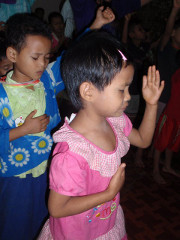
Burma (MNN) — In a tightly-controlled nation riddled with severe human rights violations, even the smallest of reforms is a step forward, right?
Perhaps.
But Dyann Romeijn with Vision Beyond Borders is waiting to see how Burma's latest press reforms will play out for people affected most by the country's violence: over 500,000 ethnic refugees. The last time MNN spoke with Vision Beyond Borders about Burma's reforms, it was about the negative side effects inflicted upon refugees. Would press reforms cause the same problems?
"It's hard to say at this point," Romeijn states. "A lot of times the government is closing off areas where the violence and stuff is. So I don't know that the [refugees] would have access to the press. That remains to be seen."
The proposed press reforms are Step 2 in the government's 3-stage process to full media freedom. In the first step, publications were allowed to be released without prior censorship. Burma only has one independent television channel; the third step in this process would support the growth of private media.
Although Burma has come a long way over the past year, some issues still need to be addressed. Earlier this month, a UN Specialist assessed the situation in Burma, and while praising the country's progress, noted a significant number of human rights concerns. Romeijn says the governmental changes aren't trickling down to those who are suffering.
"The majority of people in the ethnic areas are not seeing any real change," says Romeijn. "We are encouraged by some of the reforms that are taking place within the mainstream. But again, those that have taken place so far have not affected the ethnic groups, so I don't know how much effect the press reforms will have."
On a positive note, the horrendous trials suffered by Burma's ethnic groups are working to fortify believers and further the spread of the Gospel. Approximately 70% of each the Karen and Kachin people groups follow Christ and proclaim Him as Lord.
"In those ethnic groups, Christianity is spreading; it's continuing to grow," Romeijn reports. "And through the persecution, what we're seeing is a strengthening of their faith. They're just resolute; they're becoming solid in their beliefs."
Romeijn says the biggest contribution you can make is this: prayer.
"That's probably the most important thing people can do," she emphasizes. "All the money in the world will not solve the problems in Burma. They're too deep.
"Only God can touch and reform hearts, and so it truly is through prayer that we'll see a change there."
You can help in practical ways too. Click here to collect items that can be sent to refugees in Burma, like toiletries and medicine. You can support a child or pastor in Burma by clicking here, or go to Southeast Asia on a short-term mission trip with Vision Beyond Borders.
Vision Beyond Borders also produced a short documentary about the Karen people of Burma. Click here to watch it online.
